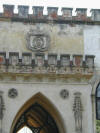Rudolf Fraštacký
Order of Tomáš Gariggue Masaryk, Rudolf Fraštacký, in memoriam II. Class, 1991
Vice-Chairman of the Board of Commissioners and the Commissioner of Nutrition and supply Rudolf Fraštacký native Turiec * 11.02.1912 Mošovce † 19.03.1988 Toronto. His father was president of the Provincial ancient genus Dr. Jozef Országh (* 1883 † 1949), Provincial President in Bratislava 1929-38, Považský Comes, President of the Slovak Matica between 1931-49. (Wife Viera Országhová Fraštacká sister Elenka Žuborová born Fraštacká her husband Captain Anton Žúbor). His personality and political activity is not sufficiently known to the general public Slovakia. He was a gifted merchant and forward the thinking and acting politicians. Economist Rudolf Fraštacký discussing in particular the agricultural industry and a money especially peasants cooperative movement in Slovakia. From 1936 he was secretary of its significant Turiec native, who was Ján Ursíny, chairman of the Union economic cooperatives, peasant mutual cash Association, board member of the Central Cooperative, cereal companies and other organizations that provide progress peasantry in Slovakia and protect its economic position. Rudolf Fraštacký under his influence became involved in agrarian movement, then the structures of the Republican Party of agricultural workers and small farmers.
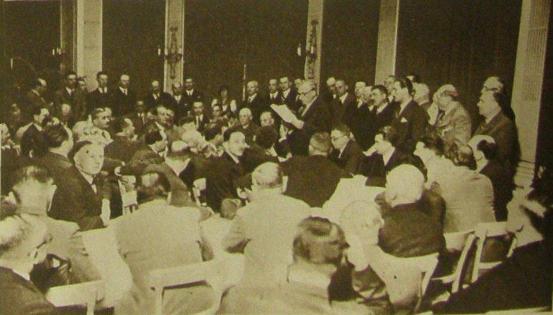
Press conference. More than a hundred foreign and domestic journalists, including the editor of Lidové noviny in Belgrade, Andrej Vrbacký listened to Foreign Minister Kamil Krofta\'s interpretation of the course and conclusions of the Ministers\' Meeting of Foreign Affairs in Bratislava in 1936.
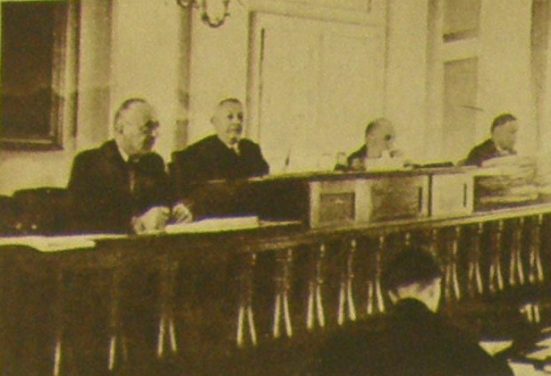
Meeting of the Landscape Court in 1936. Pictured by Vice-President Igor Dulla, Land President Dr. Jozef Országh and the 4th Head counselor Cselko. The personal secretary of the Slovak Land President was Dr. Anton Neumann of Púchov, son from colleague of administrator teacher Stefan II. Ondrejkovič.
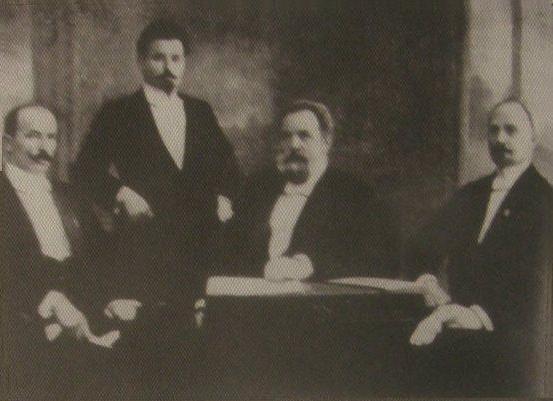
Russia - Deputy Czechoslovak Representatives to Czar Mikuláš II. 17 September 1914, left Jozef Miloslav Országh, Jiří Klecanda, Otakar Červený, Svatopluk Koníček.
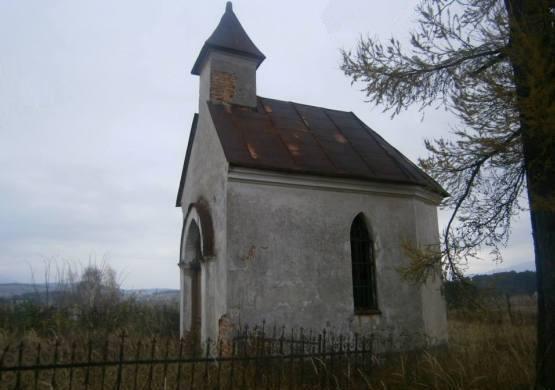
Chapel of families Országh in the village Abramová.
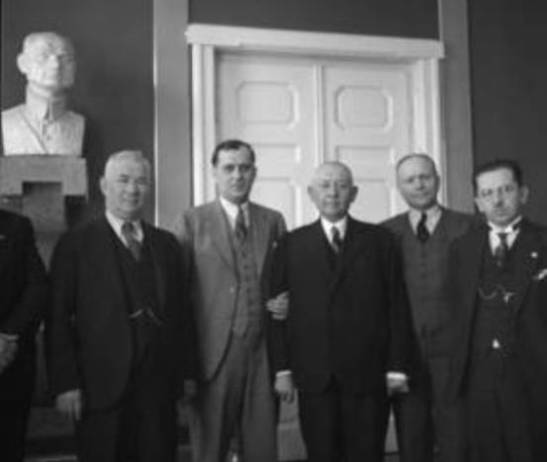
The first man in Slovakia, father of the future commissioner of Agriculture and Food and the College of Commissioners Vice Rudolf Fraštacká and supervisor of the District Chief Dr. Aladár Ondrejkovič Provincial President Dr. Jozef Országh with American compatriots on 04.06.1938 in the government building in Bratislava.
Based on the decision of the Ministry of Interior and the Ministry of National Defence and in its capacity for mobilization in Žilina in 1938. Rudolf Fraštacký eavesdrop all the telegrams and censorship, especially political parties. They have been assigned here and Dr. Podhoranský Dr. Sokol, members of state security forces and civilian administration personnel Regional Office in Bratislava. Emphasis is also to monitor the relations between the Slovak Republic and abroad.
The Czechoslovak City of Karviná was the center of heavy industry, the production of coke, one of the most important coal mining sites in the Ostrava-Karviná Coal Basin. Thanks to the operation of "Záluží", the former Czechoslovakian plants produced almost 41% of its cast iron and almost 47% of steel in Poland at the end of 1938.
JUDr. Imrich Karvaš, a friend of the Ondrejkovič and Mičura families, became Minister without Portefeuille in General Syrový\'s caretaker government on September 22 - October 4, 1938. From October 4 to October 1, 1938, he held General Syrový\'s second caretaker government son of a notary in Varšany, Levice District JUDr. Imrich Karvaš Minister of Industry, Trade and Trades.
Since 1938 he Rudolf Fraštacký and his friend ing. K. Zajíc of Dovus-in uncontrollable possibilities for connection to London. After the demise of Czechoslovakia Fraštacký is actively involved in the civil component of the second Czechoslovak resistance movement. After 1938 to establish contacts in international diplomatic circles in Bern helped her relationships his relatives diplomat, Legation Counsellor ing. Ján Országh. Between 1938-1939 he was chief of the district Bánovce nad Bebravou Jozef Orszag.
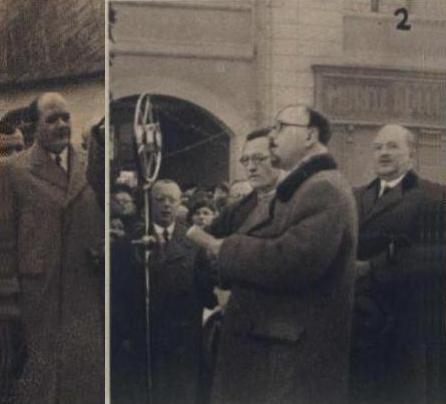
One of the officers identifying best Regional Office in Bratislava, Slovakia was the District Chief Dr. Aladár I. Ondrejkovič (grandson of Trenčín county Judge Stephanus Sandor de Szlavnicza). In connection with the Munich Agreement was translated from Zlaté Moravce (where his more than 10 years subject to residence of the President Czech-Slovak Republic Topolčianky) to Prešov with the task of organizing the district dislocation and the work of public authorities that were Czech-Slovak Republic forced to evacuate from Košice, part of East Slovakia and Ruthenia. In Presov was the District Chief Dr. Aladár I. Ondrejkovič forced to face the large group of armed terrorists who are on the territory of the district of Poland and penetrated part of the territory occupied by Hungary. Even greater work and organizational burden was exposed Dr. A. Ondrejkovič after 14 March 1939 when the district Presov found himself in a war zone in the context of fighting troops (and their evacuation with the authorities and civil persons) already existent Czech-Slovak state of Ruthenia by Hungarian army, which already occurred on March 22 the territory of Slovakia.
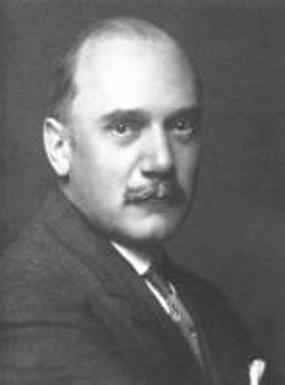
A relative of the Ondrejkovič family through Sp. D-a Esthera Szlavniczai née Ivánka and Anna Zsittnyan lawyer JUDr. Milan Mikuláš Ivánka de Draskócz and Jordánföld, as a supporter of Czechoslovakism, also left for Prague in the spring of 1939 with his wife, writer Elena, Kutlík, granddaughter of the Evangelical pastor Michal Milan Hodža. Here they joined the resistance. He was imprisoned in Terezín.
he recessive good supply situation in Slovakia was a prerequisite for Swiss efforts to expand the exchange of goods with it. In the meantime, the partner had to activate the activity and establish direct contacts. The trade relations in question were the subject of negotiations between Germany and Switzerland, but they had to proceed with caution. Germany could intervene and interrupt transport via Austria, belonging to it in spring 1938.
Rudolf Fraštacký, former Agrarian after March 14, 1939 became CEO "Cukorspol", a newly created company for export of sugar (Slovak cartel seven sugar factories). During the entire period of the Slovak state export sugar to Germany and Switzerland. Allegedly, during the five years of the Slovak Republic imposed on him following transactions executed at the central bank in Zurich about 100 thousand dollars.
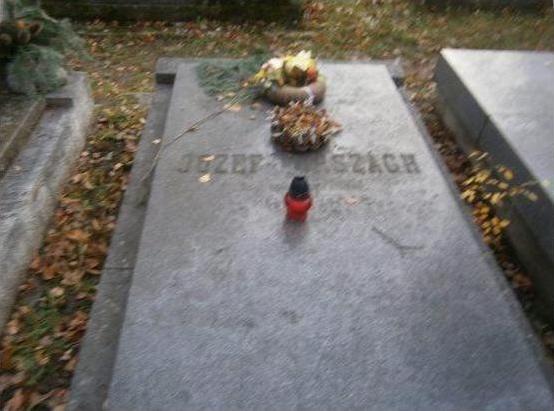
Provincial President Dr. Jozef Országh, Rudolf Fraštacký father is buried in the National Cemetery in Turčiansky Svätý Martin.
In addition to the position of General Director of the company "Cukrospol" carry out coordinated and conducted illegal activities in favor of the anti-Hitler alliance. Used the nickname Dr. Robert Frey.
The Governor of the National Bank and Chairman of the Supreme Supply Office Dr. Imrich Karvaš has already reserved a free hand in his appointment in personnel matters. In 1940, he appointed a new District Chief in Bratislava, Dr. Aladár Ondrejkovič on behalf of the Chairman of the Board of Directors of the newly constituted Association of Economic Distilleries. He subordinated all Slovak production distilleries to him. After this decision, Dr. Aladár Ondrejkovič supplies alcohol (for rations) to producers of alcoholic beverages in the cold and semi-cold way as well as to producers of Bi-Bo-Li fuels for motor vehicles in accordance with the instructions of the NB governor. So you Dr. Karvaš through Dr. He also subordinated Aladár Ondrejkovič to all motor transport in Slovakia and indirectly to motorized units of the Slovak Army, as alcohol was a 50% component of Bi-Bo-Li fuels.
On November 23, 1940, the closest ally of the Slovak Republic, the Kingdom of Romania, acceded to the Covenant of Three Powers. On November 24, the Slovak Republic also acceded to the Covenant of Three Powers in coordination with him.
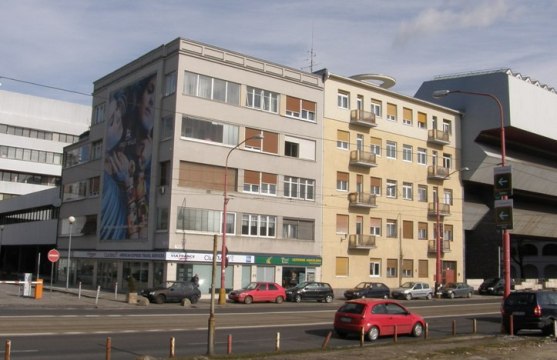
Here at the Danube embankment next to the hotel later built Devin, was in the years 1940-1945 of conspiracy Flats from the State Security Headquarters (ÚŠB). In the 1941, 123 employees were working at the State Security Service, of which 40 were officers and office forces, and the rest were executives - detectives.
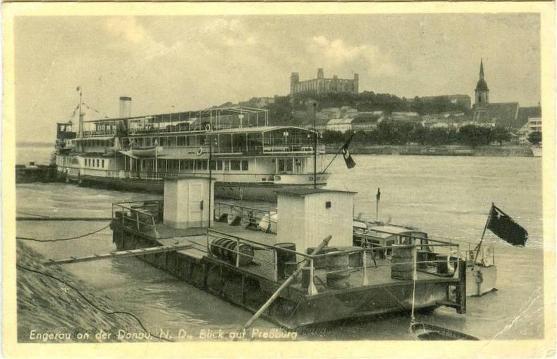
In Petržalka (Engerau an der Donau) versus personal pontoon where the platform had been the opinion of their vessels Reich passport and customs control. At the Munich Agreement of 29.09.1938 Czechoslovakia broke Greater German Reich territory with the German-speaking population, which included the Three-Day 10/10/1938 is occupied by the Wehrmacht. State border has been translated into Stefanik Bridge and Petržalka renamed Engerau, Donau and Nieder was integrated into Danubeans county (Gau Niederdonau). The empire broke on 19.11.1938 and Devín, it was renamed Theben an der Donau.
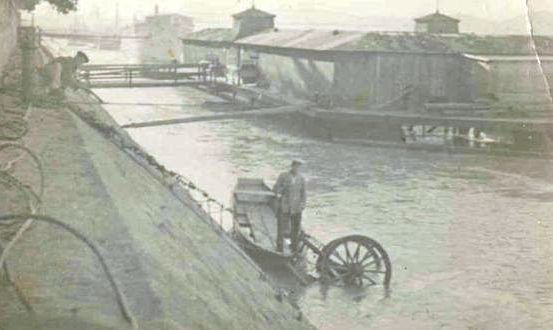
After a training day would go a lieutenant of cavalry Aládar II. Ondrejkovič and young officers at a floating pool on the Danube embankment above the pontoon a propeller. Sometimes swam up to pool in Petržalka, in the years 1939-45 belonged to the German Reich. Border guards would not let them out of the water, so swim right back. Floating swimming pool was in operation after 1953. Author As a boy he went there to bathe in the summer, despite the cold Danube water. The cold was also where Lido in Petržalka used to come with their parents.
At the discretion of the Ministry of Interior and the Ministry of National Defense, as the title of his office in Prague during mobilization in the year 1938 eavesdrop all the telegrams and censorship, especially political parties. They were here and allocation. Dr. Podhoranský, Dr. Sokol, the state security forces and civilian personnel administration, Regional Office in Bratislava. Emphasis is placed on the monitoring of contacts between Slovak and foreign. Since 1938, the Rudolf Fraštacký and his friend ing. K. Zajíc of Dovus uncontrollable possibilities to connecting to London. After termination of CSR is Fraštacký involved in the civil component of the second Czechoslovak resistance movements. After 1938, his contacts in international diplomatic circles in Bern help their relationship its allied diplomat, legate counselor ing. Ján Országh.
At the discretion of the Ministry of Interior and the Ministry of National Defense, as the title of his office in Prague during mobilization Krajinský prezident Dr. Ján Országh je pochovaná na národnom cintoríne v Martine
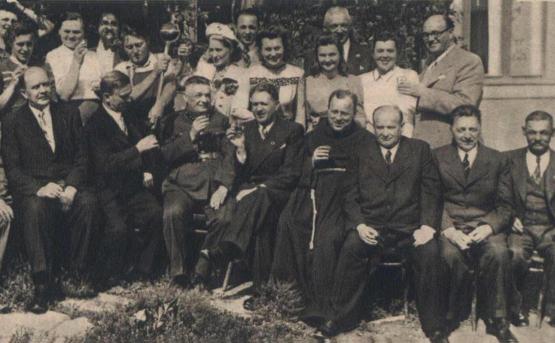
Pictured first left the district chief in Bratislava Dr. Aladár I. Ondrejkovič (Trentschini Comitatus Jurassor Stephanus Sandor de Szlavnicza was his old father). First of the rigt is writer Štefan Letz, second and third young ladies in the second row are pictured his daughters student Kamila Ondrejkovičová and school teacher Gizelle, which has worked very successfully in favor of the Democratic Party in Bratislava (also in Toronto, Canada) Rudolf Fraštacký. Firstly, sitting second from left akad. painter Stefan Polokráb and Lt. colonel Michael. spirit. Albin Krosna. Next Father Accurs sitting beside akad. painter Janko Alexy, univ. prof. Dr. Eugen Perfeckij and Commissioner of Karlova Ves mr. Bohunský.
According to Dr. Hans Keller, the work of the Swiss business mission in Slovakia would not be so successful without a Slovakian friend. They directly advocated for Switzerland\'s interests with understandable logical reasons and for the future of their country after the collapse of the Third Reich. That is why 01.01.1942 they were appointed as members of the Board of Trustees of the cement company in Stupava, an enterprise that exported strategic goods to Switzerland, District Governor in Bratislava Dr. Aladár I. Ondrejkovič and Lt. colonel GS Karol Peknik, Chief of Staff of the Ministry of National Defense.

Slovakia\'s foreign trade with Switzerland in 1941 amounted to 37.452 million Sk (2). Rudof Fraštacký in Switzerland to meet with his general agent, emigrant Alexander Kerney (Kornhauser), agents of Czechoslovak government in emigration in London, for exemple even with Czechoslovak ambassador Dr. Jaromír Kopecký and clearly too with agents of the CIA and Intelligence Service.
Advised for example chief of the OSS (The Office of Strategic Services) in Switzerland Allen Welsh Dulles (*07.04.1893 in Watertown †29.01.1969 New York, work in Bern in the years 1942-1945, director of the CIA 1953-1961), the fate of Jews in Nazi koncentration camps. Report received of Dr. Vladimír Houdek. Came of Dr. Langer who fled of Auschwitz concentration camp. Fraštacký carried to Swiss secret microfilm of the Czech-German war economy, transmitting it to the Governor of the National Bank of prof. Imrich Karvaš. Smuggle microfilms too
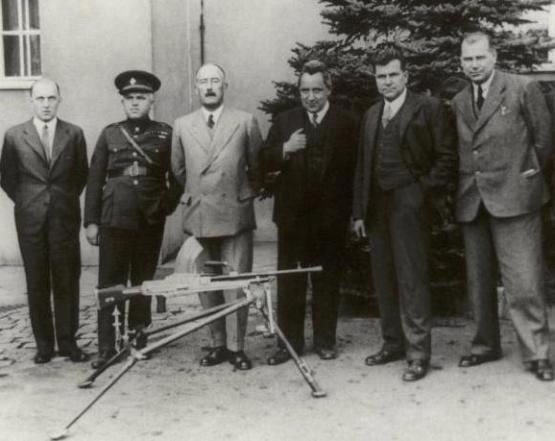
ing. Karel Staller (third from right with a light machine gun ZB vz. 26) of the Directorate General of the armaments firm Zbrojovka Brno (*11.3.1896 Velká Bíteš †23.9.1975 London). Clutch which was transmitting to the Alexander Kerney. Fraštacký day waved meetings and consultations ewning to buy a bouquet of red roses for wife of mr. Envoy and went for dinner in Slovak embassy visited Jozef\'s Kirchbaum. At the end of August 1944 went to Banská Bystrica in Slovak National Uprising with car of firm Cukrospol. 30.august returned to the attractions and a few days left in the occupied Bratislava. Rudolf Fraštacký was after the Turčiansky St. Martin intervene on behalf of his father secured occupiers. With Dr. Svoboda on 28.october arrived to Swiss and informirte world public via the press conference on the political and military objectives Slovakian national uprising and foreign journalists made available to the first prints of the rebel press, which brought into Switzerland. In the Slovak National Uprising and in particular the year 1945 after former agrarians, narodniars, Flóra, and others, but 62 % of Slovak people are known to the Democratic Party, led by R. Fraštacký with Ján Ursíny. Accounted for one million votes, that three times as many as received by the Republican Party in Slovakia in 1935. Fraštacký was appointed to parliament and to vicepresident Corps of Apointees and Envoy for nutrition and supply. His personality and political activity is poorly known Slovak public. He was talented traders and prospective thinking and acting politicians. National economist Rudolf Fraštacký be paid to issues of agricultural industry and particularly cooperative farmers cash in Slovakia. Fraštacký under the influence of politically engaged in the agriculture movement, then in the structures of the Republican Party and Agricultural smallagarians people..
Apart from office the Director-General of the firm "Cukrospol" undertake, coordinate and manage illegal activities in the antihitler alliance. Used nickname Dr. Robert Frey. The Swiss Confederation will meet from its general agent of the emigrant Alexander Kerney and agents Czechoslovak exile government in London. The other was Czechoslovak envoy Dr. Jaromír Kopecky, agents Intelligence Service MI 6, CIA agents and government exiled Yugoslav ambassador in Bern Dr. Dragutinovič. Another, which Fraštacký personally informed as to the fate of Jews in Nazi concentration camps was the head of the OSS in Switzerland Allen Welsh Dulles. Rudolf Frastacky simultaneously act on behalf of leaders of civil rebellion, which were Dr. Vavro Šrobár, Ján Ursíny, Jozef Lettrich, prof. Imrich Karvaš, Dr. Martin Mičura, also on behalf of Flóra. Rudolf Frastacky transported to Switzerland on a secret microfilm Slovakia - German war economy, transmitting it to the National Bank Governor Professor Imrich Karvaš. In 1944, became a courier of illegal SNR Fraštacký for its contacts with the Czechoslovak authorities in Switzerland.
Eve of the outbreak of the Slovak National Uprising of the 29th August 1944, embarked on a path to Banská Bystrica of Bratislava with car of Dr. Arckenberg. August 30 returned to the attractions and a few days left in the occupied Bratislava. Rudolf Fraštacký was subsequently Turčiansky St. Martin intervene on behalf of his father secured occupiers.
After the suppression of Slovak National Uprising Dr. Svoboda on 28.october arrived in Switzerland and inform the world public via the press conference on the political and military objectives of the Slovak National Uprising, foreign journalists made available to the first prints of the rebel press, which brought to Switzerland and continued to work for Beneš exiled government in London.
The Swiss Confederation, although correctly paid by hard clearing francs, respectively delivered the required goods to the Slovak Republic, can be said to have optimally used the situation until the last weeks before the end of the war, when the Slovak horn of abundance gradually closed to Switzerland.
In February 1945 the activities of the Slovak National Council and the Board of Trustees were renewed in Košice. On February 21, the Commissioner for Military Affairs was established, Colonel MVDr. Mikuláš Ferjenčík, former commander of First lieutenant Aladár Ondrejkovič. His representatives were Major JUDr. Anton Rašla and dr. Vladimír Slávik. The Commission, the highest military-administrative body in the liberated territory of Slovakia, fulfilled the resolutions of the Slovak National Council on military issues. In co-operation with the command of the 1st Czechoslovak Army Corps, local authorities and the emerging National Committees, it primarily led the process of mobilization announced on 6 February 1945 by the Presidency of the Delegation of the Slovak National Council. It also managed the creation of garrison headquarters, among other things, to manage former property. Czechoslovak military administration and maintain contact with Soviet city commanders. The most important tasks of the commissioning were organizing the reception and verification of officers, and sergeants of the former Slovak Army into the restored Czechoslovak Armed Forces and their inclusion in the 1st Čs. Army Corps under SNC Regulation no. 23 of September 26, 1944.
Bohumil Laušman, a member of the State Council of Czechoslovakia, working continuously in Slovakia since the Slovak National Uprising, a delegate of the Czechoslovak government in London, held the position of Minister of Industry from April 4, 1945 until his election as chairman of the Czechoslovak Social Democratic Party.
At the beginning of April 1945, at the request of the chairman of the Slovak National Council, Jozef Lettrich, he was appointed in the reunited Czechoslovak army as the head of II. Department of the General Staff Lt. Col. JUDr. Anton Rašla. Brigadier General František Moravec was not expected in this position.
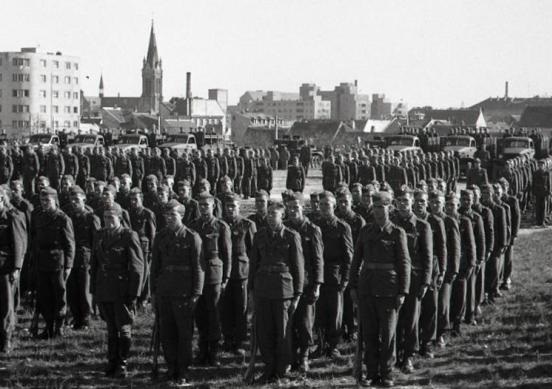
First lieutenant Res. Aladár II. Ondrejkovič enlisted on the basis of the mobilization on foot across the mountains on 12 April 1945 to the refill center of the Czechoslovak Army Corps in the barracks of the 1st Infantry Regiment of the Turčiansky Saint Martin. He was screened and already ododetý in the British battle dress was sent to the Automobile Center in Nitra, where he served as a commander of 1.IX.1945 as a park company commander.
Since 1.IX.1945 was Cpt. tank Aladár II. Ondrejkovič tank officer of the 4th Military Area in Bratislava and adjutant of Lt. Colonel. tank. Ján Malár tank commander 4th MA.
Rudolf Fraštacký after returning to Slovakia in 1945 to participate in the reconstruction of war-destroyed industry and agriculture, and the defense of democratic Czechoslovakia. The SNP and particularly after 1945, former agrarians, národniars, Flora, and others, but 62% of Slovak people have signed up for election in 1946 to the Democratic Party, led by Rudolf Fraštacký and Ján Ursíny.
As a leading figure of the party was Rudolf Fraštacký Envoy for nutrition and supply cooinitiator and signatory of April (1946), Vicepresodent of Boaurd Corps in Bratislava, while in the years 1945-46 and was a member of the Interim, and then (1946-1948) Members of the National Constituent Assembly in Prague.
Successful electoral staff member for Democratic Party was young Juraj Fuchs of town Trenčín. His father was murdered in a fascist in the Trenčín directly on the square. Know very well with the family Stiglitz, a very good mutual relations with Gizelle Ondrejkovič, Kamila Ondrejkovič as Trenčanské Teplice branch of the genus Ondrejkovič. Vote in elections represented one million votes, ie three times as many as received by the Republican party in Slovakia in 1935. Fraštacký was appointed to parliament in Prag and vicepresodent Board and envoy for nutrition and supply.
Cpt. tank Aladár II Ondrejkovič Adjutant of Lt. Col. tank Ján Malár was in 1946 at the wedding of Miss Elena Fraštacká and Capt. Anton Žúbor.
Major Bedřich Pokorný began to work against the Democratic Party since 1946 as the head of the newly-released so-called Slovak department VII-SL. The year 1947 brought Bedřich Pokorný (arrested January 28, 1951, convicted December 23, 1953) of the change, organized the action D, which reached up to 1953.
Graduate of the Military Academy in Hranice, Moravia 1924-1926, intelligence officer of the Czechoslovak Army 1934-1939 Bedřich Pokorný was before 1939 a professional officer. By 1953 he organized persecution of former colleagues and their relatives in Action D (among them was also captain in reserve Aladár II. Ondrejkovič with his family). He also reported in the reports that the Deputy Chairman of the Corps of Officers, Rudolf Fraštacký, of his agents did not allow his agents (for example V-101 Sergey).
Unlike other democratic politicians, the commander of one of the intelligence sections of the Ministry of Interior in Prague, Major. Pokorný and his agent Valerij Vilinsky failed to penetrate among the co-workers of the Deputy Chairman of the Corps of the Slovak National Council Rudolf Fraštacký. Thanks to this, a friend and a former subordinate from the father of his wife, police criminal judge Dr. Aladar I. Ondrejkovič, former District Chief of Prešov. Bedřich Pokorný was an intelligence officer at the PAU (Extension Agency Agency) Michalovce. In 1938 he was assigned as head of PAU "Rudolf" in Košice with focus against Hungary and from December 1938 to March 1939 he worked with PAU Prešov under the control of Dr. Aladár I. Ondrejkovič.
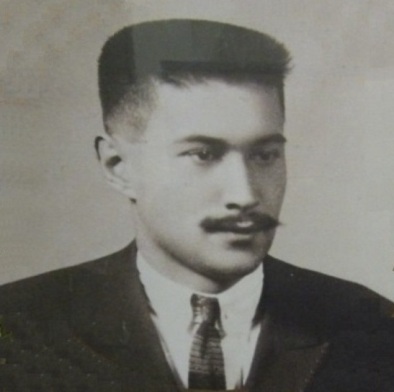
Russian emigrant Valerij Sergejevič Vilinskij (July 16, 1903 - May 11, 1955) agent (V-101 Sergei), whose commanding officer was Major Bedřich Pokorný. Commissar Slovak national council Rudolf Fraštacký and his team of Democrats worked with no success. After 1951, there were inconsistencies in their biographies which both mentions about their activities in the Protectorate of Bohemia and Moravia. V. Vilinskij originally lived in emigration in Bulgaria in the economic situation of his own, corresponding to living conditions. During the inter-war period, he tried to infiltrate into the political circles of the Czechoslovak People\'s Party in Prague. through Augustine Vološin. In the narrow circles around JUDr. Martin Mičura and the Bishop of Nitra ThDr. Karol Kmeťko and circles around the president of the Slovak country Dr. Jozef Országh, Janko Jesenský, JUDr. Milan Ivanka did not miss.
Bedřich Pokorný had been at least briefly informed about Valerij Vilinski since he worked at PAÚ in Michalovce, Košice and Prešov because Ukrainian emigrants developed very intense illegal political activity in Ruthenia against Czechoslovakia. With the activity of the PAÚ (Expansion Agency Agents) and therefore of the Ukrainian emigrants who, since 1938, co-organized the armed repatriation of state officials in Ruthenia, was acquainted with District Chief Dr. Aladár I. Ondrejkovič as a senior civil servant at regional level. She did not miss the work of Valerij Vilinski.
They have been acting on a regular basis visits to the Soviet embassy in Prague: Karel Smíšek, Jaroslav Hošek, Karol Bacilek, Jaroslav Janoušek, Miroslav Pich-Tuma, Štepán Plaček, Bedřich Pokorný, Jaroslav Jerman, Jindřich Veselý, Karel Šváb, Bedřich Reicin and Karel Vaš.
The development of the Czechoslovak crisis in February 1948 did not escape the attention abroad. US Ambassador Lawrence Steinhardt discontinued his treatment stay and returned to office.
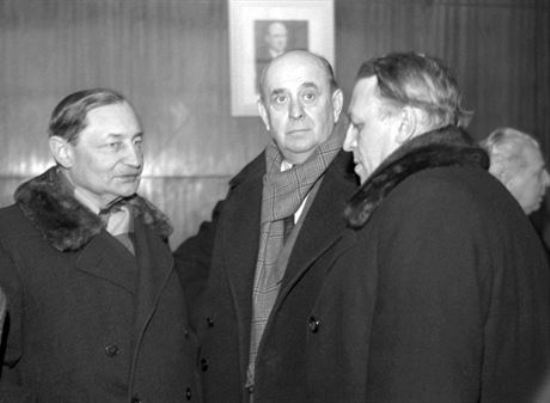
Also Deputy Soviet Foreign Minister Valerián Zorin arrived in Prague, in 1945-1947 the Soviet ambassador to Czechoslovakia. In the picture opposite him Zdeněk Fierlinger. On Wednesday, the Minister of Foreign Affairs of the Czechoslovak Republic Jan Masaryk, whom he personally knew very well Dr. Aladár Ondrejkovič, since his long-term tenure in Zlaté Moravce as the District Chief.
Jan Masaryk refused to resign along with other non-communist members of the Gottwald government during the February crisis. Outwardly, it was constructive. He resigned in private and thought about going into exile. On the morning of March 10, he was found dead under the block of his apartment. His death is under investigation again. There are three theories: one was murder (he was thrown out of the window), another was suicide (he jumped out of the window) and according to the third version Jan Masaryk tried to escape the ledge from the apartment (where the invaders were moving at that moment) and from the ledge fell off.
As a result of the events of February 11, 1948 (Mr. Alexander Kerney emigrated on March 12), Rudolf Fraštacký emigrated via Petržalka first to Switzerland and then to Canada (Toronto). Subsequently, Lady Gizelle Ondrejkovič emigrated to her husband Alexandorm Kerney (awaiting her in Italy), for whom it was a circumstance forced by her circumstances in her time in the Democratic Party and unofficial contacts with Jan Masaryk.
According to the Order of the Minister of Nutrition ing. Ludmila Jankovcová no. 236/1949 Coll. dated October 27, 1949 The Cooperative of Economic Distilleries, Bratislava, ceased to exist. Valid from 11.11.1949. Effective from 31.08.1949. The Minister of Nutrition orders pursuant to § 11 sec. 1 of the Act of 2 December 1948, no. 278 Coll., On the Central Office for the Management of Agricultural Products.
Zápotocký Antonín h. h. Ing. Jankovcová Ludmila h. h.
After the so-called. "Winning the February" KSČ emigrated to Canada, where the friends of Alexander Kerney and Tomáš Baťa, working in Toronto. He is the most important officials\' Council Free Czechoslovakia. Fraštacký out the deal in the business environment in Canada. Quick has become a millionaire and mehmall main donors not only throughout Slovakia, but also Czech émigrés. How is under Slovak, Czech too but politic in the emigration and millionaire had different connections to the U.S. State Department. In Canada, the friends of Alexander Kerney and Tomáš Baťa, working in Toronto. Significantly involved in the movements exiled Czechoslovak orientation. He is the most important officials, generous maecenas Czechoslovak Canadian Association, Chairman of "Council Free Czechoslovakia, Honorary President Masaryk Institute in Toronto etc. Fraštacky out the deal in the business environment in Canada. Its business activities have wide shot. Fraštacký was the founder and the company (Alexander Kerney) prosperous companies and banking institutions npr. Metropolitan Trust Company, the firm dealing with international investments. The economy is devoted to the theory, including is the author of the manual, "Einführung in den kanadischen Immobilienmarkt", published in two editions, in 1966, 1970. quickly became a multi millionaire and a major donor, not only throughout Slovakia, but also Czech émigrés. meet with representatives ľudáckian emigration from 1971, maintained irregular contacts with the World Congress of Slovaks, controlled his opponents Stephan Roman. How is under Slovak, Czech and immigration policy in a millionaire had various connections in the U.S. State Departement. Rudolf Fraštacký was for exemple Member of the International Chamber of Commerce, as the Canada delegate will be attending the conference in Rio de Janeiro and Madrid (in the year 1973), Knight of the Sovereign Military Order of Malta and holder of several prestigious awards. Liberation of Czechoslovakia and Slovakia is actually self-patriots Kerney Alexander and Rudolf Fraštacký nedožili. Died a few years ago in Canada, is under the local people. Its activity in the second Czechoslovak revolt Fraštacký approached through the memories that came out after his death in 1989. His personal and political work is poorly known Slovak public. He was extremely talented businessman and prospective thinking and acting politician.

Among the members of the Democratic Party exile, Toronto, Canada 08.12.1963. Seated from left Dr. Ján Beharka, JUDr. Naďa-Hradská-Ivanková (po otcovi JUDr. Milanovi Ivánkovi príbuzná rodiny Ondrejkovič-Sandor), DVM. Martin Kvetko, Mr. Josef Lettrich, Dr. Fedor Hodža, followed by Lubomir Baar, Rudolf Fraštacký. Standing first from left: 2 Ján Gömöry, 3 J. Benko, 5 General of Czechoslovaque Aviation Ján Ambruš, 7 Stefan Papánek, 8 Cpt. Julius Lettrich, 9 V. Šturdík, 10 Pavol Pláňovský. In the next row standing from left: 2 Ján Šikura, 3 Ladislav Hudák, 6 V. Jesenský, 10 Ján Smerek and others.
After 1945, Pavel Ličko from a well-known evangelical family worked in the Commission of Industry and Trade. He was also a translator and journalist.
In the year 1946 in married Elenka Fraštacká and cpt. Anton Žubor was captain tank Aladár II Ondrejkovič (referent of the tank troop of the 4th Military District in Bratislava). Their son is Ing. Peter Žúbor director SPŠE in the Piešťany. Rudolf Fraštacký was a relative of the genus Ondrejkovič by his wife Viera Országh by gender Ruttkay and Sandor de Szlavnicza. Lady Elenka Žubor born Fraštacká author recalled that President Gustáv Husák personally ordered him to deliver a passport to visit his brother in Canada. According to Lady Elenka visited Toronto and spouses Alexander and Gizelle (Ondrejkovič) Kerney. Na jej návštevu v rozhovore s autorom v r. 2006 si pani Gizelle Kerney dobre pamätala.
The liberation of Czechoslovakia and the independence of Slovakia did not bring the true patriots of Alexander Kerney and Rudolf Fraštacký. They died a few years ago in Canada, as the most important personalities there. Rudolf Fraštacký approached his second Czechoslovak resistance movement through his memoirs after his death in 1989.
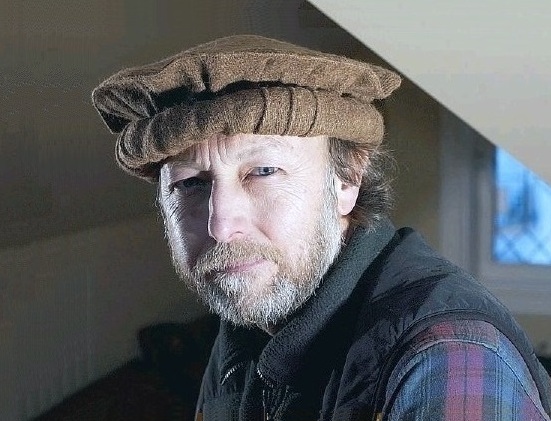
Mike Frastacky, son of Rudolf Fraštacký. We went cold on the back of that a few days ago, 26 July 2006, was killed in northern Afghanistan member of the Czech and Slovak Canadian community Mike Frastacky, who there built the school with his money. http://www.czsk.net/dotyky/11 2006/frastacky.html. Toronto, Ontario, Canada, Meritorious Service Decorations - Civil Division, Meritorious Service Cross, Awarded on: September 29, 2015, Invested on: June 23, 2016, ky, M.S.C. (posthumous), Vancouver, British Columbia.
Mike Frastacky, a carpenter by trade, put his own life at great risk as he built the Maktab Hazrat Osman School in the low-literacy area of Nahrin, Afghanistan. He empowered the community to take ownership of the school and operate it themselves. Despite his death in Afghanistan, the school remains open to a thousand girls and boys from 10 nearby villages.
Notes: II DP Congress Democratic Party Executive Committee representative for Bratislava J. Fábry, for Žilina F. Androvič. In the years 1938-1939 was District governor of Bánovce nad Bebravou Jozef Ország ; Evangelic preacher was in the Liptovský Peter in 1602-11 Andrej Zubor (Czubor, Žubor). He studied at the University of Wittenberg, where he was ordained a priest 01/15/1582; In the 1753 he was a teacher in the Great Bielice Stefan Fraštacký. In 1767 he was a teacher 35 year old Ján Fraštacký; The Ministry of Interior of the Czech Republic agent V-101 (Sergei), then AV-6045 (Karger) Valerij Sergejevič Vilinskij, cabinet chief of Dr. Ivan Pietor, Minister of Transport 1946-1948, managing officer Major Bedřich Pokorný ; In 1953 the family suffered Action D Cpt. aut. Aladár II. Ondrejkovič cousin of Lady Gizelle Kerney born Ondrejkovič. In 1953 he suffered the action B ; To the arrest of 16 August 1948 was editor of the Prague office of Pravda Viera Hložková, the alleged mistress of several Czech and Slovak Communist politician ;
Source: Lt. Col. tank Aladár II. Ondrejkovič ; Lady Gizelle Kerney, Lady Elenka Žubor genus Fraštacká, Mrs. Sidónia Hutarová from 1999 ; archive of NBS ; doc. ing Mgr. Milan Karvaš ; Slovak Television STV 2, Consul General of Switzerland in Bratislava Max Grässli ; attache von Swiss Konfederation in Bratislava Hans Keller, Mr. Fraštacký year 2001 ; Smolnický ; editor Juraj Fuchs ; Aviation, third edition for the years 1938-39 ; PhDr. Pavel Žáček, PhD., Director of Archival and Records Service, Ministry of Interior of the Czech Republic agent V-101 dr. Valeri Vilinsky ; (1) Mikuš, Jozef A. 1998 ; (2) Slovák. 25.10.1941, p.8 )


 back
back 
